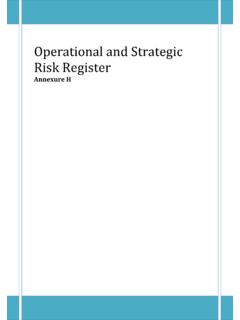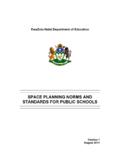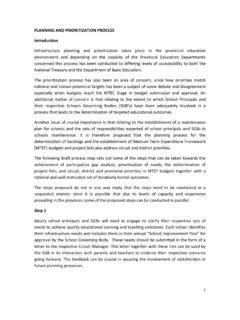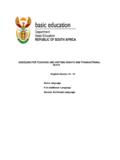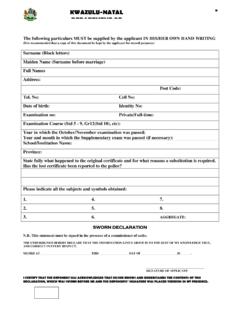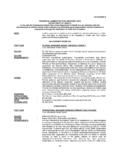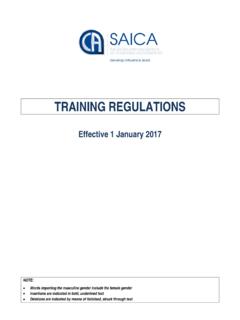Transcription of Disciplinary Code and Procedures - KZN Internet
1 Department of Education Disciplinary code and Procedures ANNEXURE B Department of Education CONTENTS PAGE BACKGROUND 1 1. Purpose and Scope 1 2. Principles 1 2 3. Scope of Application 2 3 4. code , Rules and Standards 3 5. Procedures : Disciplinary Actions 4 6 6. Serious Misconduct 6 7. Disciplinary Enquiry 6 10 8. Appeal 10 11 Attached Schedules Schedule A : Acts of Misconduct Schedule B : Written Warning Schedule C : Final Written Warning Schedule D : Notice of Disciplinary Meeting Schedule C : Notice of Appeal Department of Education BACKGROUND This document is comprised primarily of the content of the Public Service Co-ordinating Bargaining Council Resolution ( PSCBC ) No. 2 of 1999. 1. PURPOSE AND SCOPE 1. The purpose of this code and Procedures is:- to support constructive labour relations in the public service; to promote mutual respect between employees and between employees and employer; to ensure that managers and employees share a common understanding of misconduct and discipline; to promote acceptable conduct; to provide employees and the employer with a quick and easy reference for the application of discipline; to avert and correct unacceptable conduct; and to prevent arbitrary or discriminatory actions by managers toward employees.
2 2. PRINCIPLES 2. The following principles inform the code and Procedure and must inform any decision to discipline an employee. Discipline is a corrective measure and not a punitive one. Department of Education Discipline must be applied in a prompt, fair, consistent and progressive manner. Discipline is a management function. A Disciplinary code is necessary for the efficient delivery of service and the fair treatment of public servants, and ensures that employees: a) have a fair hearing in a formal or informal setting; b) are timeously informed of allegations of misconduct made against them; c) receive written reasons for a decision taken; and d) have the right to appeal against any decision. As far as possible, Disciplinary Procedures shall take place in the place of work and be understandable to all employees.
3 If an employee commits misconduct that is also a criminal offence, the criminal procedure and the Disciplinary procedure will continue as separate and different proceedings. Disciplinary proceedings do not replace or seek to imitate court proceedings. The code and Procedures are guidelines and may be departed from in appropriate ciecumt circumstances. 3. SCOPE OF APPLICATION 3. This code and Procedures apply to the employer and all employees falling within the registered scope of the PSCBC. It does not, however, apply to the employer and employees covered by a Disciplinary code and Procedures , Department of Education concluded in a sectoral council and approved by the PSCBC to ensure uniformity of Procedures across the public service, or contained in legislation or regulations. 4. code , RULES AND STANDARDS The code of Good Practice contained in Schedule 8 of the Labour Relations Act, Act 66 of 1995, insofar as it relates to discipline, constitutes part of this code and Procedure.
4 Employee conduct that may warrant a Disciplinary action is listed in Schedule A, attached hereto. This list is not exhaustive. Management may discipline an employee in respect of other conduct, if the employee knew, or ought to have known, that the conduct constituted grounds for Disciplinary action. In applying Schedule A, management must assess the seriousness of the alleged misconduct by considering: a) the actual or potential impact of the alleged misconduct on the work of the public service, the employee s component and colleagues, and the public; b) the nature of the employee s work and responsibilities; and c) the circumstances in which the alleged misconduct took place. Department of Education 5. Procedures : Disciplinary ACTIONS Corrective counselling. In cases where the seriousness of the misconduct warrants counselling, the manager or the employee must: a) bring the misconduct to the employee s attention; b) determine the reasons for the misconduct and give the employee an opportunity to respond to the allegations; c) seek to get agreement on how to remedy the conduct; and d) take steps to implement the agreed course of action.
5 Verbal warnings. In cases where the seriousness of the misconduct warrants a verbal warning, the manager of the employee may give a verbal warning. The manager must inform the employee that further misconduct may result in more serious Disciplinary action, and record the warning. Written warnings. In cases where the seriousness of the misconduct warrants a written warning, the manager may give the employee a written warning. The following provisions apply to written warnings: a) The written warning may use the form of Schedule B, attached hereto. b) The manager must give a copy of the written warning to the employee, who must sign receipt of it. If the employee refuses to sign receipt, the manager must hand the warning to the employee in the presence of another employee, and sign in confirmation that the written warning was conveyed to the employee.
6 Department of Education c) The written warning must be filed in the employee s personal file. d) A written warning remains valid for six months. At the expiry of the six months, the written warning must be removed from the employee s personal file and destroyed. e) If during the six month period, the employee is subject to Disciplinary action, the written warning may be taken into account in deciding an appropriate sanction. Final written warnings. In cases where the seriousness of the misconduct warrants a final written warning, the manager may give the employee a final written warning. The following provisions apply to final written warnings: a) The final written warning may use the form of Schedule C, attached hereto. b) The manager must give a copy of the final written warning to the employee, who must sign receipt of it.
7 If the employee refuses to sign receipt, the manager must hand the warning to the employee in the presence of another employee, and sign in confirmation that the final written warning was conveyed to the employee. c) The final written warning must be filed in the employee s personal file. d) A final written warning remains valid for six months. At the expiry of the six months, the final written warning must be removed from the employee s personal file and destroyed. e) If during the six month period, the employee is subject to Disciplinary action, the final written warning may be taken into account in deciding an appropriate sanction. Department of Education For less serious forms of misconduct, no formal enquiry shall be held. For the purpose of determining appropriate Disciplinary actions, valid warnings for similar offences by the employee shall be taken into account.
8 6. SERIOUS MISCONDUCT 6. If the alleged misconduct justifies a more serious form of Disciplinary action than provided for in paragraph 5, the employer may initiate a Disciplinary enquiry. The employer must appoint a representative, who as far as possible should be the manager for the employee, to initiate the enquiry. 7. Disciplinary ENQUIRY Notice of enquiry a) The employee must be given notice at least five working days before the date of the hearing. b) The employee must sign receipt of the notice. If the employee refuses to sign receipt of the notice, it must be given to the employee in the presence of a fellow employee who shall sign in confirmation that the notice was conveyed to the employee. c) The written notice of the Disciplinary meeting must use the form of Schedule D, attached hereto, and provide: Department of Education i.
9 A description of the allegations of misconduct and the main evidence on which the employer will rely; ii. details of the time, place and venue of the hearing; and iii. information on the rights of the employee to representation by a fellow employee or a recognised trade union, and to bring witnesses to the hearing. Precautionary suspension a) The employer may suspend an employee on full pay or transfer the employee if: i) the employee is alleged to have committed a serious offence; and ii) the employer believes that the presence of an employee at the workplace might jeopardise any investigation into the alleged misconduct, or endanger the well being or safety of any person on state property. b) A suspension of this kind is a precautionary measure that does not constitute a judgement, and must be on full pay.
10 C) If the employee is suspended or transferred as a precautionary measure, the employer must hold a Disciplinary hearing within a month. The chair of the hearing must then decide on any further postponement. Department of Education Conducting the Disciplinary hearing a) The Disciplinary hearing must be held within ten working days after the notice referred to in paragraph (a) is delivered to the employee. b) The chair of the hearing must be an employee on a higher grade than the representative of the employer. If the employee charged with misconduct is a Head of Department, the presiding officer must be an executing authority or another person with appropriate knowledge designated by the Cabinet or the Provincial Executive Committee. c) If the employee wishes, she or he may be represented in the hearing by a fellow employee or a representative of a recognised trade union.
